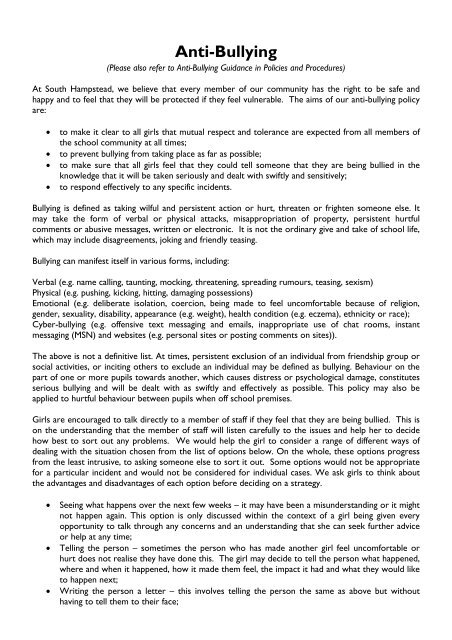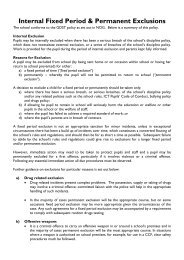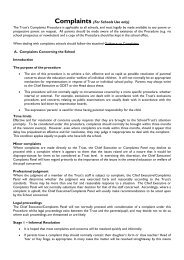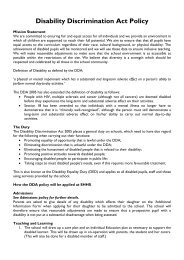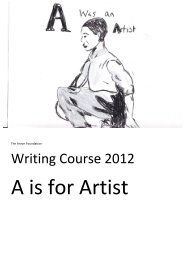Anti-Bullying - South Hampstead High School
Anti-Bullying - South Hampstead High School
Anti-Bullying - South Hampstead High School
You also want an ePaper? Increase the reach of your titles
YUMPU automatically turns print PDFs into web optimized ePapers that Google loves.
<strong>Anti</strong>-<strong>Bullying</strong><br />
(Please also refer to <strong>Anti</strong>-<strong>Bullying</strong> Guidance in Policies and Procedures)<br />
At <strong>South</strong> <strong>Hampstead</strong>, we believe that every member of our community has the right to be safe and<br />
happy and to feel that they will be protected if they feel vulnerable. The aims of our anti-bullying policy<br />
are:<br />
• to make it clear to all girls that mutual respect and tolerance are expected from all members of<br />
the school community at all times;<br />
• to prevent bullying from taking place as far as possible;<br />
• to make sure that all girls feel that they could tell someone that they are being bullied in the<br />
knowledge that it will be taken seriously and dealt with swiftly and sensitively;<br />
• to respond effectively to any specific incidents.<br />
<strong>Bullying</strong> is defined as taking wilful and persistent action or hurt, threaten or frighten someone else. It<br />
may take the form of verbal or physical attacks, misappropriation of property, persistent hurtful<br />
comments or abusive messages, written or electronic. It is not the ordinary give and take of school life,<br />
which may include disagreements, joking and friendly teasing.<br />
<strong>Bullying</strong> can manifest itself in various forms, including:<br />
Verbal (e.g. name calling, taunting, mocking, threatening, spreading rumours, teasing, sexism)<br />
Physical (e.g. pushing, kicking, hitting, damaging possessions)<br />
Emotional (e.g. deliberate isolation, coercion, being made to feel uncomfortable because of religion,<br />
gender, sexuality, disability, appearance (e.g. weight), health condition (e.g. eczema), ethnicity or race);<br />
Cyber-bullying (e.g. offensive text messaging and emails, inappropriate use of chat rooms, instant<br />
messaging (MSN) and websites (e.g. personal sites or posting comments on sites)).<br />
The above is not a definitive list. At times, persistent exclusion of an individual from friendship group or<br />
social activities, or inciting others to exclude an individual may be defined as bullying. Behaviour on the<br />
part of one or more pupils towards another, which causes distress or psychological damage, constitutes<br />
serious bullying and will be dealt with as swiftly and effectively as possible. This policy may also be<br />
applied to hurtful behaviour between pupils when off school premises.<br />
Girls are encouraged to talk directly to a member of staff if they feel that they are being bullied. This is<br />
on the understanding that the member of staff will listen carefully to the issues and help her to decide<br />
how best to sort out any problems. We would help the girl to consider a range of different ways of<br />
dealing with the situation chosen from the list of options below. On the whole, these options progress<br />
from the least intrusive, to asking someone else to sort it out. Some options would not be appropriate<br />
for a particular incident and would not be considered for individual cases. We ask girls to think about<br />
the advantages and disadvantages of each option before deciding on a strategy.<br />
• Seeing what happens over the next few weeks – it may have been a misunderstanding or it might<br />
not happen again. This option is only discussed within the context of a girl being given every<br />
opportunity to talk through any concerns and an understanding that she can seek further advice<br />
or help at any time;<br />
• Telling the person – sometimes the person who has made another girl feel uncomfortable or<br />
hurt does not realise they have done this. The girl may decide to tell the person what happened,<br />
where and when it happened, how it made them feel, the impact it had and what they would like<br />
to happen next;<br />
• Writing the person a letter – this involves telling the person the same as above but without<br />
having to tell them to their face;
• Asking a friend to help – there may be someone who knows the girl doing the bullying quite well<br />
and who could tell them that their behaviour is upsetting someone. This option depends upon<br />
the girl who could do this being able to do it professionally and well and not exaggerating the<br />
incident;<br />
• Ask a senior girl to tell the person – again, this option depends upon the senior girl being able to<br />
it professionally and well;<br />
• Asking a teacher to arrange a small-group meeting – the girl may feel able to confront the person<br />
doing the bullying with her concerns if a teacher is present to make sure things don’t get out of<br />
hand. This needs to be done without blaming the other girl but trying to get them to understand<br />
how hurtful their behaviour can be and how it needs to be stopped;<br />
• Writing down a complaint and giving it to a girl’s Head of Year or another senior member of<br />
staff. Sometimes, the bullying can be so serious that it needs to be properly investigated and the<br />
person doing the bullying punished. This formal method usually involves communication with<br />
parents and other people may be called in to tell of their experiences. The outcome will be<br />
decided by one of the Deputy Heads in consultation with the Headmistress.<br />
The only person who really knows which option will be best is the individual concerned. We<br />
recommend that girls think carefully about each one and perhaps talk it over with their form tutor,<br />
Head of Year, any other member of staff with whom they have a good relationship, with the <strong>School</strong><br />
Counsellor or with a more senior girl. Something that we emphasise is that doing something about<br />
bullying is not ‘sneaking’ or ‘grassing’. It is very important that all cases of bullying are dealt with. It is in<br />
everybody’s interest to bring bullying out into the open, including that of the bully themselves, who will<br />
often need help too.<br />
If a case of bullying comes to light, the following procedures will be followed:<br />
• the girl would be assured that her concerns will be taken seriously;<br />
• she will have the opportunity to discuss her concerns with a teacher, a senior girl or another<br />
member of staff;<br />
• the range of options will be presented to her and time taken to talk through each one, discussing<br />
the advantages and disadvantages;<br />
• she will be encouraged to choose one of the options;<br />
• she will be given support and shown the strategies that will help her follow the option she has<br />
chosen effectively. This may include help with arranging a meeting, assisting her in getting an<br />
older girl to help, help with writing a letter or support during an investigation process;<br />
• in serious cases of bullying, it will be necessary to conduct a formal investigation<br />
• in very serious cases of bullying, it will be necessary for girl(s) named in the allegations to stay at<br />
home pending the outcome of a full and fair investigation without prejudice;<br />
• the students using bullying behaviour will be helped to see that their actions are totally<br />
unacceptable and have serious, possibly long-term, consequences;<br />
• where appropriate, parents of girls involved will be informed of what has happened and invited<br />
to come to school to discuss the issue.<br />
• if it transpires that bullying has taken place, the appropriate sanction will be imposed in order to<br />
impress on the perpetrator that what she has done is unacceptable, deter her from repeating<br />
that behaviour and signal to other pupils that the behaviour is unacceptable and deter them from<br />
doing it.<br />
• fixed term exclusions are a possible sanction and; in the most serious cases, permanent<br />
exclusion.<br />
The school follows a range of measures to prevent bullying, particularly through the teaching across all<br />
curriculum areas. Staff are aware of actions which can cause distress and make someone feel that they<br />
are being bullied. This issue is addressed in many areas of the curriculum, in PSHE and throughout the<br />
general life of the school.
Records should be kept of all investigatory meetings, meetings with parents, telephone calls etc. based<br />
on factual and contemporaneous notes.<br />
Our anti-bullying policy and procedures are outlined in all girls’ homework diary, in the New Parents’<br />
Handbook, that all parents receive and in the Staff Handbook. Reference to our anti-bullying policy and<br />
procedures and/or any changes in these is made to all staff at regular staff meetings, to new staff as part<br />
of their induction policy and to all girls as part of their PSHE programme.<br />
The most important thing to remember is that if a girl is feeling upset or hurt as a result of somebody<br />
else’s behaviour, she should talk to someone about it.<br />
AL November 2007<br />
Reviewed by SMT May 2009<br />
Approved by GDST 15 th May 2009<br />
Reviewed Sep 2009
What to do in case of a <strong>Bullying</strong> Incident


